A Bahamian
Entrepreneurship Experience
Cultivating an Entrepreneurial Mindset Through Practice
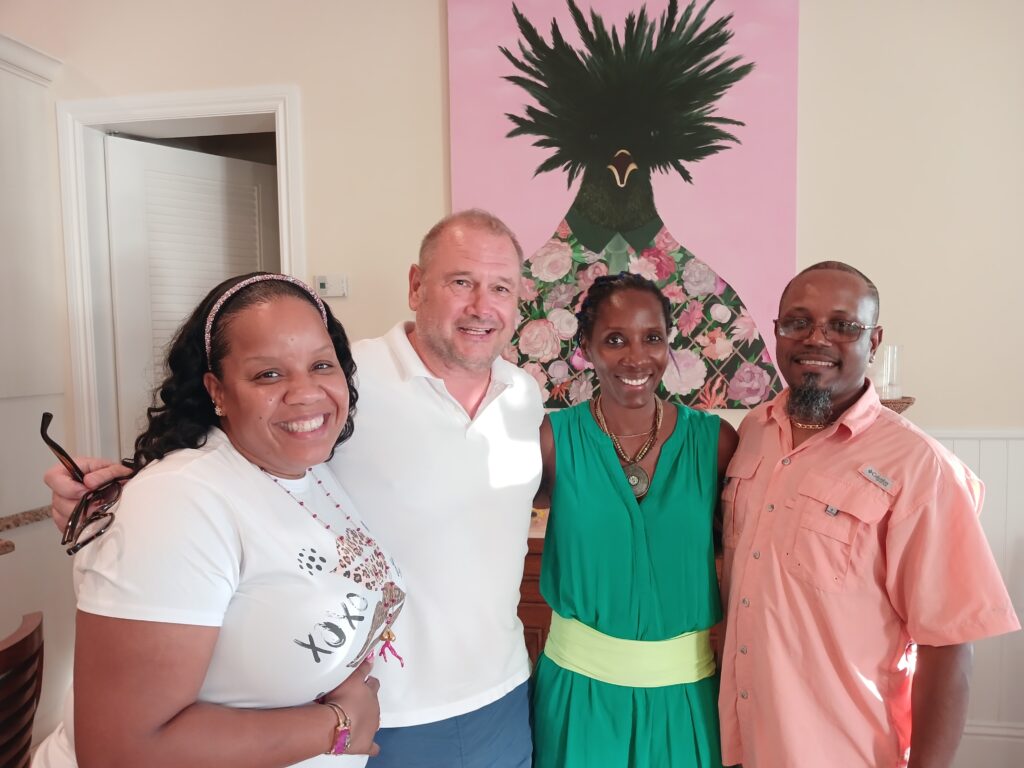
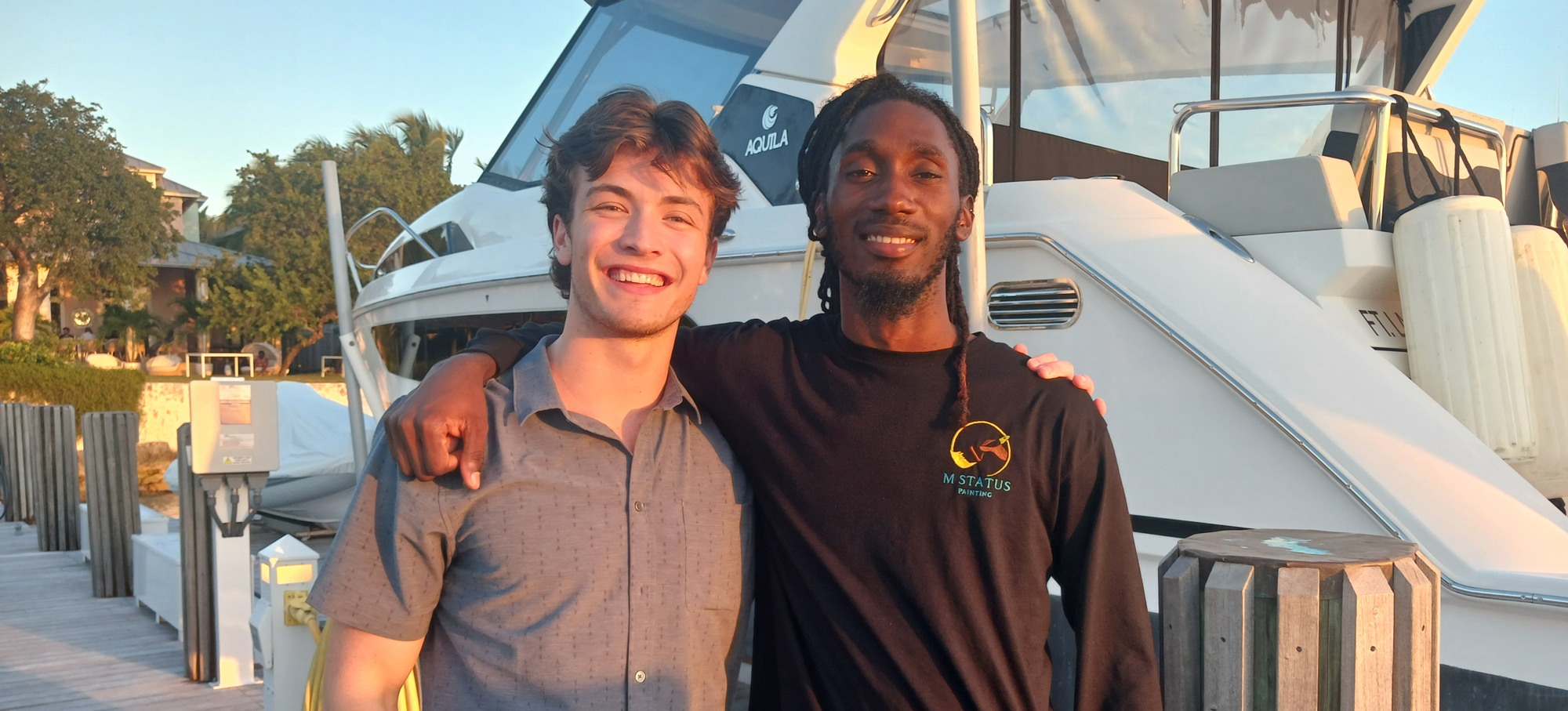
Somewhere over a dockside dinner in the glow of a Bahamian sunset, it hit them: Maybe the best educational experiences happen when everybody’s a teacher, everybody’s a student and learning doesn’t have to pause to ask for directions.
Professor Dan Cohen liked the idea of an experiential, immersive course in his curriculum, and he knew the 12 students selected for a unique entrepreneurship course would get more than nice scenery out of the trip and more than honed communication skills from working with aspiring entrepreneurs.
“To me it was like Pro Humanitate in action. It was incredibly impactful. The relationship between the Wake Forest and the Bahamian students was a beautiful thing to watch.”
– Professor Dan Cohen, the John C. Whitaker Jr. Executive Director of Entrepreneurship at Wake Forest
Some offered theory, forged by hours in the classroom with distinguished scholars. Others provided the lessons developed from the crucible of real-life trial, error, hardship and joy. All had something to give; all had something to take away.
“You don’t need to have a lot to give a lot,” said Derick Mejia Torres (’24) of Boutte, Louisiana, who is majoring in Latin American and Latino Studies with minors in entrepreneurship and politics. “(The Bahamian students) don’t have a lot. Not even a lot of time. They don’t have the resources that we have, but they give so much more.”
The mutually beneficial class is known as Cultivating an Entrepreneurial Mindset Through Practice. It is the result of a collaboration between Cohen and Rick and Lisa Anderson (P ’21, P ’22), accomplished entrepreneurs and philanthropists who began splitting their time between their Iowa home and the Bahamas nearly a decade ago. The Andersons started Mom’s Meals, a business dedicated to preparing and delivering nutritious food to people of reduced mobility, in 1999. Upon making a second home on Harbour Island, they vowed to help their new community.
In general, the country of the Bahamas is considered the wealthiest of the Caribbean nations, but that can feel like an empty distinction. Harbour Island, one of the country’s 18 economic regions, is three miles long by a half-mile wide with a population of 1,861. Only one of every six adults – a figure far below the national average – has pursued education beyond high school.
Taking that discrepancy to heart and to action, Rick and Lisa Anderson were instrumental in founding the Harbour Island Trade School (HITS) in 2020 with the goal of inspiring local citizens to widen their opportunities and pursue their dreams. The school is a valuable asset in a location that has its share of logistical roadblocks to economic growth.
Harbour Island’s lone airstrip has been shut down. Only one dock can accept commercial deliveries, and the nearest major port is in Nassau – 63 miles away. Gas cost $5.32 a gallon in January 2024, and golf carts outnumber standard commercial vehicles.
Tourism, which the government said employed half the labor force and accounted for 60% of Gross Domestic Product nationwide in 2016, may have an even larger market share on Harbour Island than elsewhere in the Bahamas.
The class really came together when Cohen and the Andersons saw an opportunity to merge the most important part of their assets – the human portion. The Wake Forest students would take what they had learned in various classes in the entrepreneurship program and share it with HITS students one-on-one. To ensure that the experience was focused on the program, the Andersons supported the needs of the students once they arrived on the island.
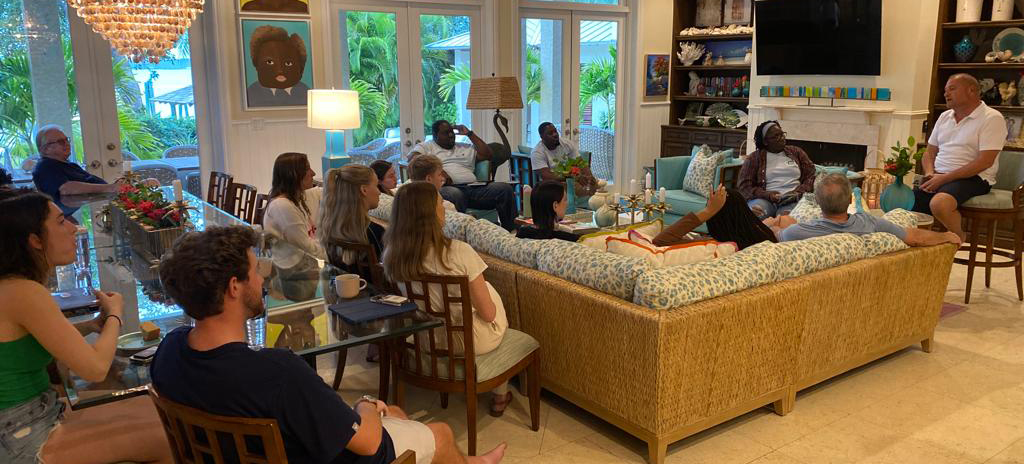
On the first day, Wake Forest students were paired with HITS counterparts, beginning a journey that ended six days later with the HITS students pitching ideas to a room full of curious and potential investors.
By day, the Bahamians worked their own businesses or other jobs while Cohen and guest speakers taught the Wake Foresters principles such as scaling, which involves intelligent and gradual growth so that revenue exceeds new costs as a business develops; cost of acquisition; balance sheets; and break-even analysis.
The real-time learning, when combined with previous courses in entrepreneurship, made the Wake Forest students viable teachers.
“The students who came here were so sharp,” Rick Anderson said of Cohen’s pupils. “They took trade-school students who were not as strong in cost departments and brought that area to the forefront. I wouldn’t call them professionals – they’re not out of college yet – but it sure came off that way.”
In the late afternoon, the HITS students arrived.
“Many of them would work nine-hour shifts and then come to us,” said Bella Craven (’24), an economics major and entrepreneurship minor from West Palm Beach, Florida. “They would have to work so hard because we were ready to hit the ground running.
“They were eager to make a better living for themselves, and that motivation was so inspiring to me. You can’t get that in the classroom. You don’t have the opportunity to see it unless you’re in a program such as this one.”
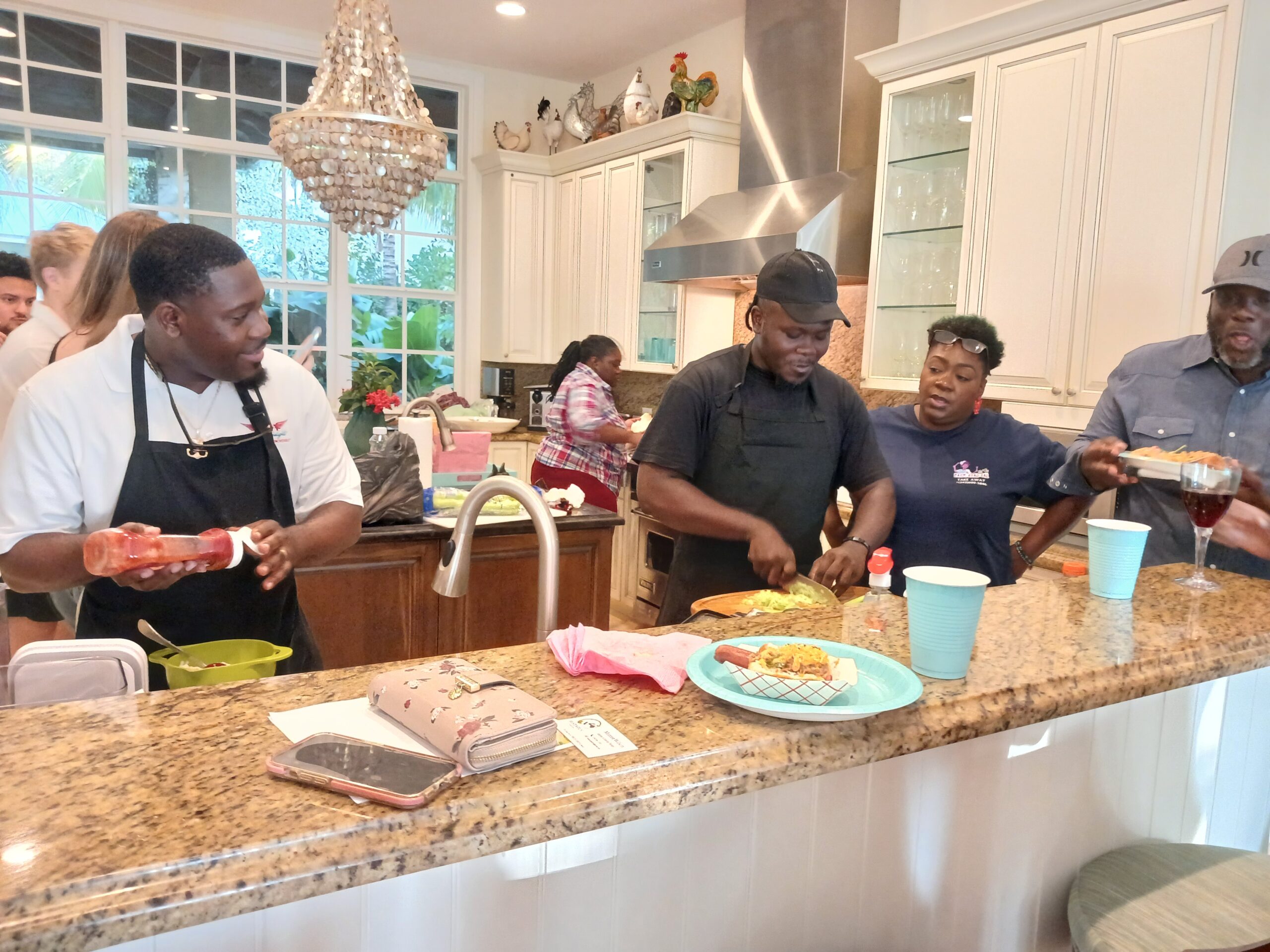
As they helped chefs prepare catering menus and craftsmen contemplate supplies and services, Craven, Mejia Torres and others quickly discovered a common issue: The Bahamian students were consistently undervaluing their products and underestimating what they could fairly charge customers, many of whom were tourists.
“A lot of the money is in tourism,” Craven said. “The restaurants and hotels understood that. Some of the smaller businesses didn’t realize how much they could benefit from it.”
For the Wake Foresters, that issue brought up a fundamental challenge: communicating knowledge and urgency in the spirit of partnership.
“You have to encourage them while realizing you’re younger and you’re an outsider,” Craven said.
So as the week went on, the students-turned-teachers learned to maintain a hands-on approach while varying the grip.
“We have to put a limit on how much we’re doing for them,” Mejia Torres said. “We have to give them resources, but they have to take ownership of what they’re doing.”
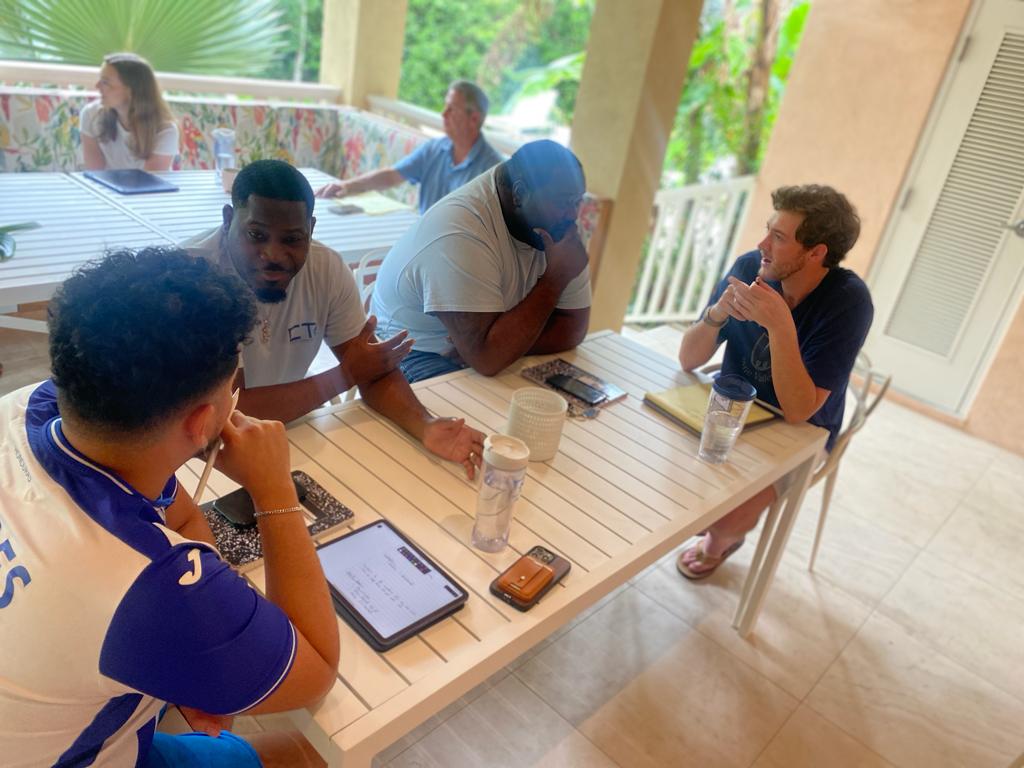
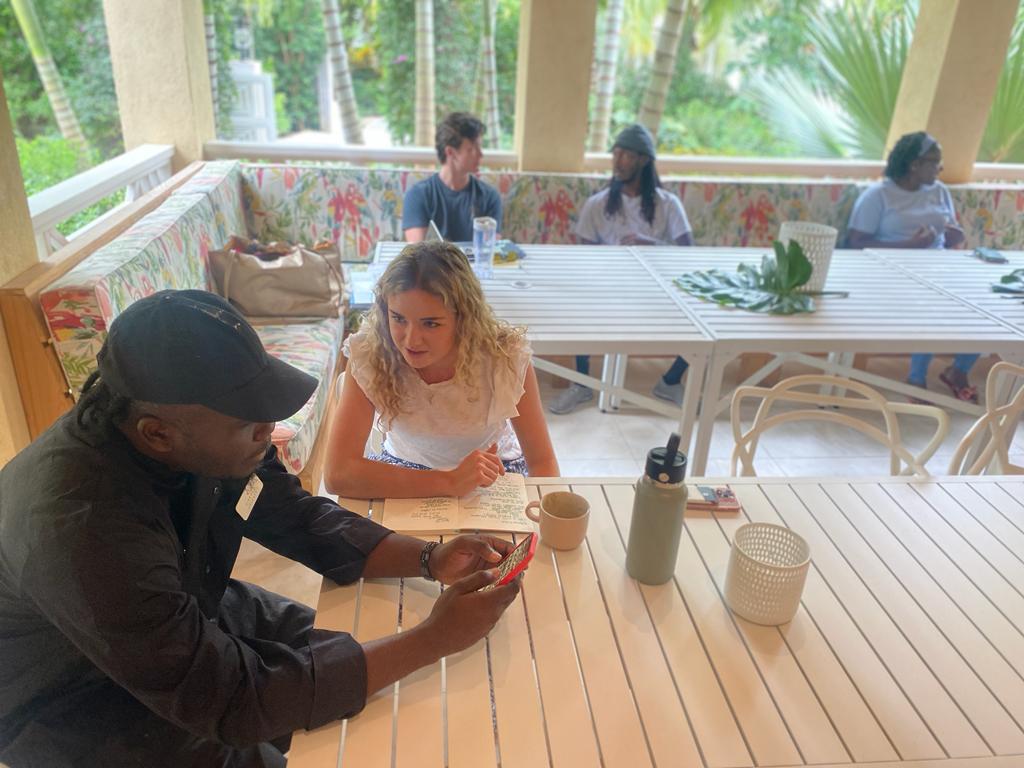
That culminated in the presentations that each HITS student made to the group of potential investors. (Think “Shark Tank” without the studio lights.) Melding recent knowledge with their own personalities and passions, the students delivered pitches that hit the target the vast majority of the time.
Nic Averill (’27) had a good feeling about his partner, Garfield, the owner of a company specializing in renting heavy equipment and small tools. As soon as the presentation began, a star was born.
“Ask anyone there,” Averill said. “Jaws dropped. He has that booming voice. It couldn’t have been any better. And it’s a reflection of the work he has done. Straight from the day job. Practice, practice, practice. Watching videos for tips. To see it all pay off was just sensational.”
Several other teams had similar stories, and the HITS students were universally grateful for the experience.
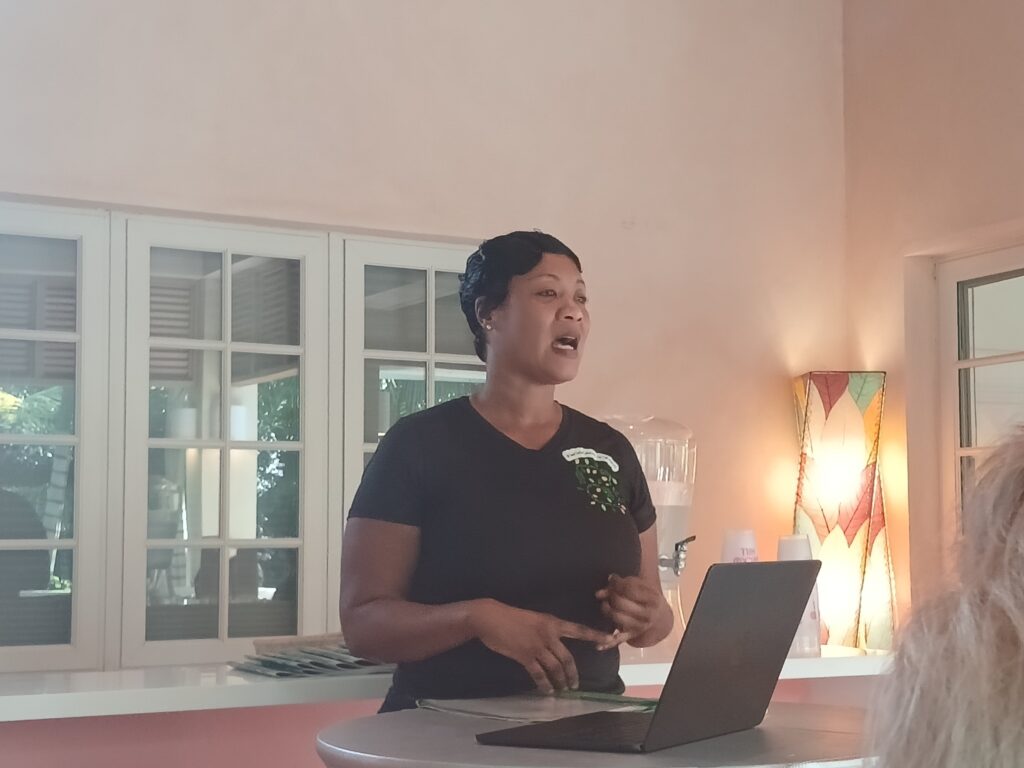
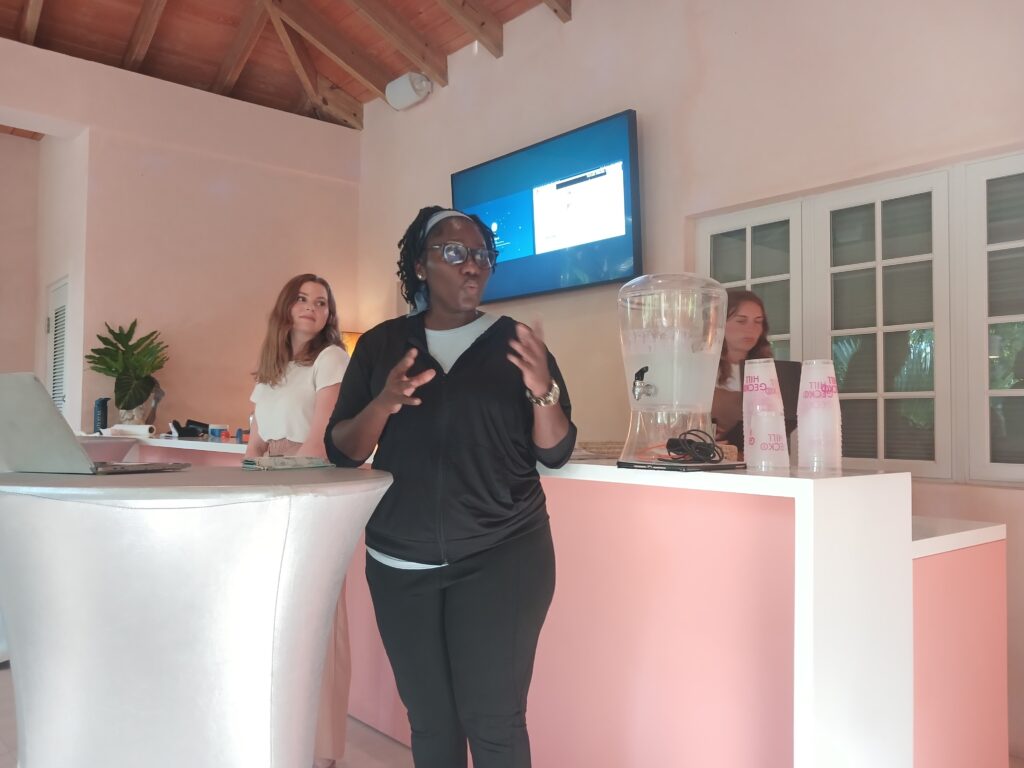
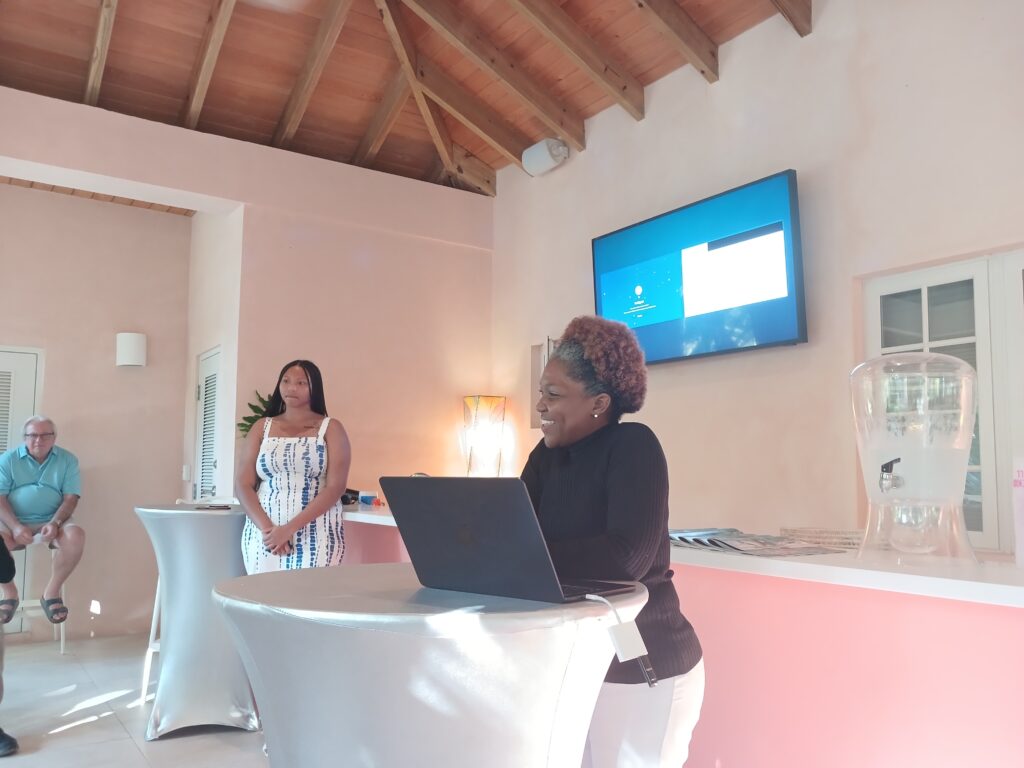
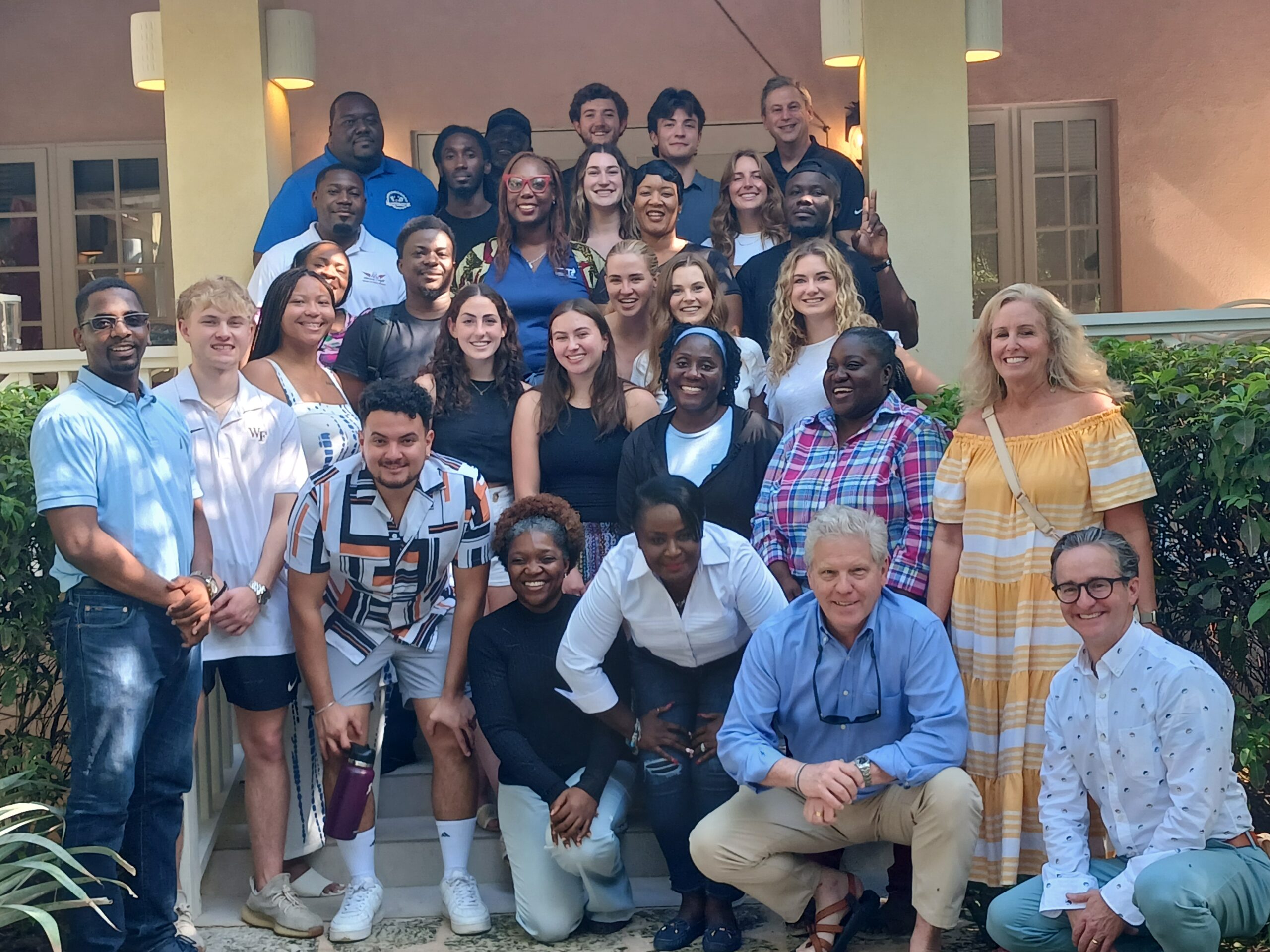
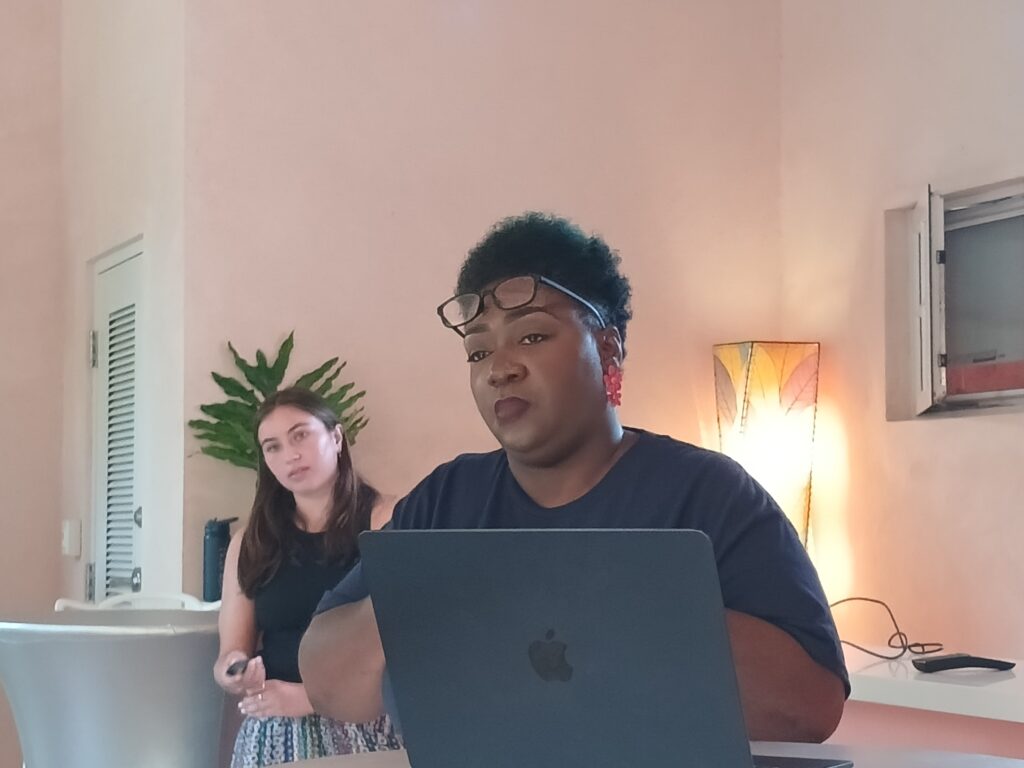
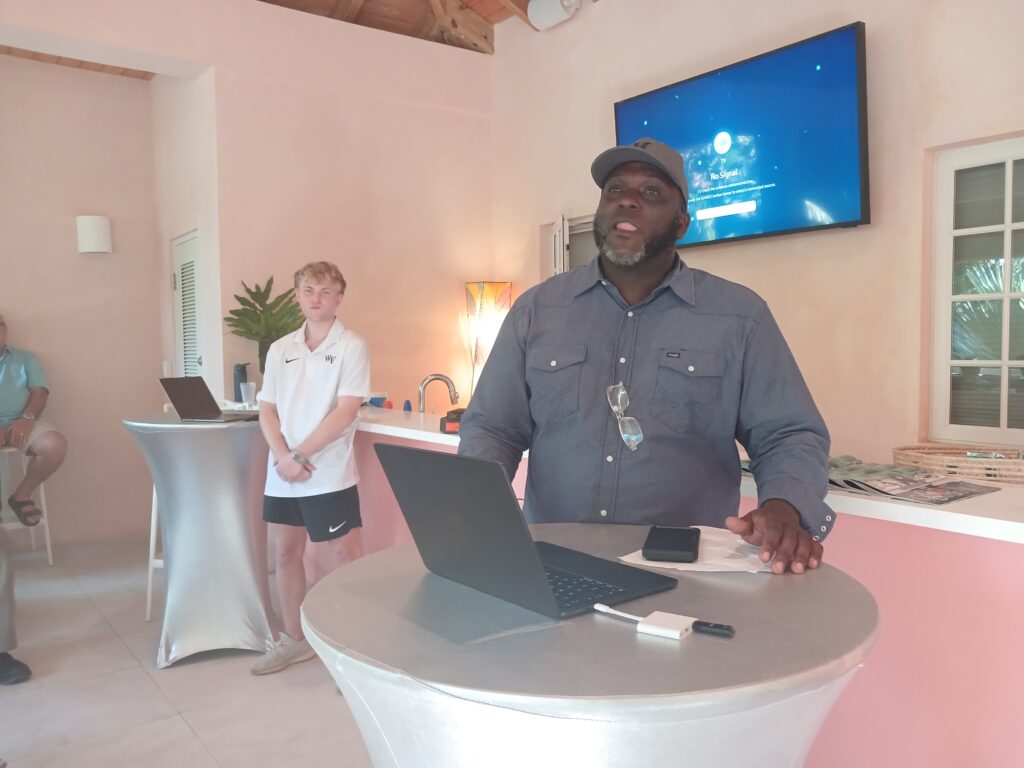
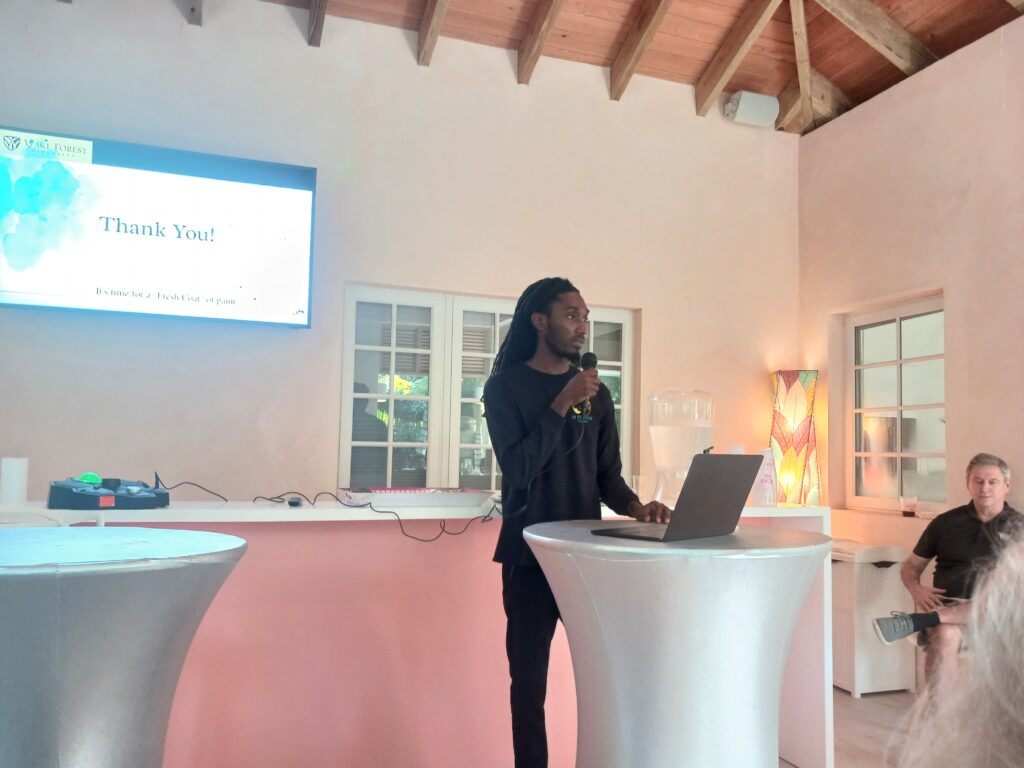
Camille Bosshard (’24), a sociology major and entrepreneurship and politics minor from Akron, Ohio, teamed with Manny, a chef who aspires to run a food truck. As a relatively recent immigrant from Haiti, he didn’t yet qualify for long-term investment from others because he hadn’t been in the Bahamas long enough to secure a business license. But he still used the experience to pick up a free-lance assignment and to build connections for the long term.
“He told me, ‘This entire class gives me wings, but you teach me how to fly,’ ” Bosshard recalled.
Marvens, who owns a gourmet pizza and bakery and a service that delivers to homes, was paired with Mejia Torres. He said the week surpassed his expectations in every way.
“I probably thought it would be more of a teaching about theory and those other things, but it was an overall experience for me,” he said.
“The insight. The information. All the knowledge received in a matter of a week just with the simple collaboration of Wake Forest students. I don’t even have the words. It was just that good.”
In turn, the Wake Foresters insisted the impact was mutual and multi-faceted. Who was teaching whom again?
The benefits began as soon as the collaborations were determined. Bosshard took to the story of her partner, the Haitian refugee. Government studies indicate Haitians have an especially tough time finding work and remaining above the poverty line, and Bosshard never forgot that.
“This wasn’t just a project,” she said. “It was someone’s life. Getting to know my partner on a personal level is where my motivation came from.
“Manny taught me the importance of believing in myself. Even when he didn’t have that many material things he could point to in order to show his success as a chef, he believed in himself, and he communicated that with confidence to potential investors. That inspired me to understand that at the end of the day, what matters is passion and the ability to work hard. He lifted me up.”
At the same time, Bosshard knew she was benefiting from experiential learning, one of the hallmarks of the entrepreneurship program.
“Being able to help someone with their company was huge,” she said. “It added a lot of value to my degree and my minor. I want to make sure I’m always giving back and not just focusing on my own career.”
Craven worked with a partner of a different background. Earlyn gave up a career as an accountant to create a business that provides an in-home, authentic Bahamian cooking and dining experience to high-end clientele.
“I helped him get organized,” Craven said. “He taught me so much more in life lessons and believing in yourself and having grit.
“The whole experience is hard to put into words. We were constantly taking in information and learning how to be the best person and the best entrepreneur we could be. I woke up every day so excited to start my day. It was the best experience I have had so far in my life.”
Bella Craven (’24)
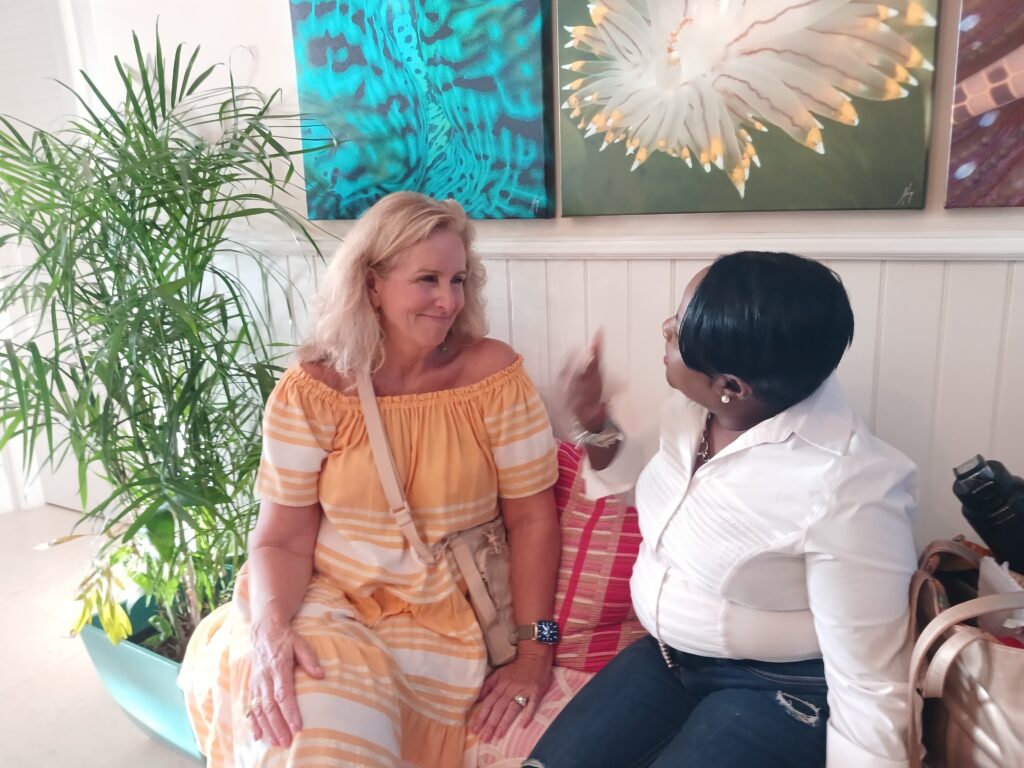
Ultimately, Lisa Anderson left everybody with a thought. There are medical missions, in which doctors and dentists travel to developing countries and provide care that patients would never otherwise receive. Entrepreneurs can take a cue from that tradition by sharing their experiences with people who can turn it into life-changing businesses.
“Entrepreneurs should be able to go on missions, too,” Bosshard said. “Every professional should have an outlet where they’re giving back.”
